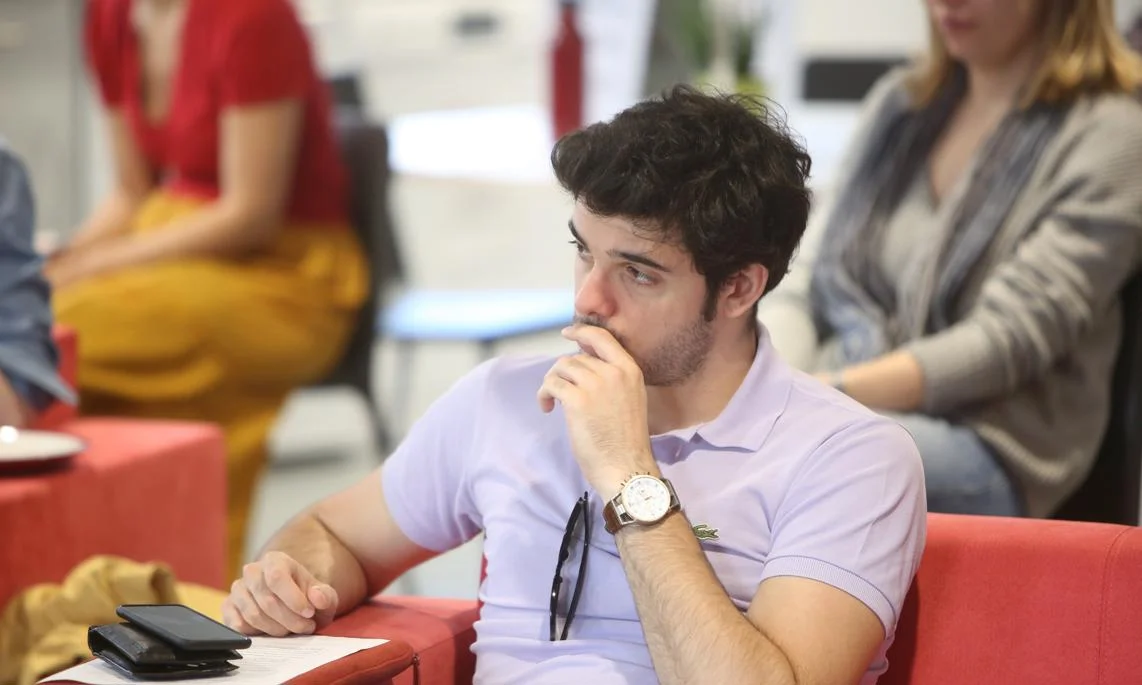Overview
Introduction
The programme
You’ll study behavioural phenomena in various ways and settings, examining different organisations and the people who work in those organisations.
As you progress through the programme, you’ll develop the analytical skills to perform robust field studies, randomised lab experiments, and quantitative research. The programme also includes comprehensive methodological training, with the opportunity to specialise in your chosen field.
You’ll begin on the master of research degree and move on to the PhD (subject to satisfactory progress). The programme gives you the chance to complete work that makes an original contribution to the field of organisational behaviour.
Students can apply for LSE and departmental financial support, including a full tuition award and a five-year annual stipend granted each year to at least one exceptional candidate applying to this programme. Find out more below under "Scholarships, studentships and other funding".
Research environment
LSE is ranked sixth in the world for social sciences and management. Our academics have multidisciplinary expertise in management, economics, psychology and sociology. You’ll benefit from this cross-cutting expertise and interdisciplinary learning.
We're also ranked second in the UK by percentage of overall four and three stars in the most recent Research Excellence Framework (REF 2021).
Our world-class academics work closely with colleagues from across the School on initiatives like the LSE Behavioural Lab, co-directed by the Department of Management and the Department of Psychological and Behavioural Science.
We actively engage with practitioners, policymakers, LSE students and alumni to enhance the quality of working life and change organisational and economic practices worldwide.
Preliminary readings
- Withey, M. J., & Cooper, W. H. (1989). Predicting exit, voice, loyalty, and neglect. Administrative Science Quarterly, 34: 521-539.
- Galinsky, A. D., Gruenfeld, D. H., & Magee, J. C. (2003). From power to action. Journal of Personality and Social Psychology, 85: 453-466.
- Colquitt, J. A., & Rodell, J. B. 2011. Justice, trust, and trustworthiness: A longitudinal analysis integrating three theoretical perspectives. Academy of Management Journal, 54: 1183-1206.
- Sutton, R. I., & Rafaeli, A. (1988). Untangling the relationship between displayed emotions and organizational sales: The case of convenience stores. Academy of Management Journal, 31: 461- 487.
- Barnes, C. M., Lucianetti, L., Bhave, D. P., & Christian, M. S. (2015). “You wouldn’t like me when I’m sleepy”: Leaders’ sleep, daily abusive supervision, and work unit engagement. Academy of Management Journal, 58(5), 1419-1437.
- Dutton, J. E., & Dukerich, J. M. (1991). Keeping an eye on the mirror: Image and identity in organizational adaptation. Academy of Management Journal, 34(3), 517-554.
- Harrison, D. A., Price, K. H., & Bell, M. P. (1998). Beyond relational demography: Time and the effect of surface- versus deep-level diversity on group cohesiveness. Academy of Management Journal, 41: 96- 107.
- Gersick, C. J. G. (1988). Time and transition in work teams: Toward a new model of group development. Academy of Management Journal, 31: 9-41.
- Chen, G., Kirkman, B. L., Kanfer, R., Allen, D., & Rosen, B. (2007). A multilevel study of leadership, empowerment, and performance in teams. Journal of Applied Psychology, 92(2), 331.
- To Hive or to Hold? Producing Professional Authority through Scut Work Abstract - Ruthanne Huising, 2015.
- The SAGE handbook of social network analysis - Peter J. Carrington, John Scott, 2011| Essential | Borgatti, S.P., & Lopez-Kidwell V. (2016). Chapter 4: Network Theory. In J. Scott, P.J. Carrington, eds. The SAGE Handbook of Social Network Analysis (SAGE Publications Ltd. London).
- Firm Resources and Sustained Competitive Advantage - Jay Barney, 1991-03.
- The Categorical Imperative: Securities Analysts and the Illegitimacy Discount - Ezra W. Zuckerman, 1999.
- A Status-Based Model of Market Competition Abstract - Joel M. Podolny, 1993
- Four formal(izable) theories of the firm? Gibbons, Robert, Journal of Economic Behavior & Organization, 58(2), 2005-10.
- Labor Pains: Change in Organizational Models and Employee Turnover in Young, High‐Tech Firms James N. Baron, Michael T. Hannan and M. Diane Burton, American Journal of Sociology, 106(4), 2001.
- Why Do Liberals Drink Lattes? Daniel DellaPosta, Yongren Shi and Michael Macy, American Journal of Sociology, 120(5), 2015.
- Patterns of Industrial Innovation Abernathy, W.J., & Utterback, J.M., Technology Review, 80(7), 1978.
Entry requirements
Upper second class honours (2:1) degree in any discipline, or the equivalent.
For the GRE/GMAT requirements for this programme see below under "Additional tests".
Please select your country from the dropdown list below to find out the entry requirements that apply to you.
Overseas
Additional tests
GRE/GMAT requirement
The GRE/GMAT is required for all applicants. We don't require a specific GRE/GMAT overall score but the test gives us an indication of your aptitude for our programmes.
A strong GMAT or GRE score will count in your favour, but other information, such as your research interests, your examination results, previous qualifications and references are central to our overall evaluation of your application. We recognise that if your first language is not English, the verbal test will be more demanding and we view your score on that basis.
There is no preference for GMAT or GRE but all applications must submit scores at the time of application. Your score should be less than five years old on 1 October 2026.
Find out more about GRE/GMAT, including detail on our requirements and submission of test scores, and LSE’s institution codes.
English language requirements
The English language requirement for this programme is Higher. Read more about our English language requirements.
Competition for places at LSE is strong. So, even if you meet the minimum entry requirements, this doesn't guarantee you an offer of a place.
However, please don’t feel deterred from applying – we want to hear from all suitably qualified students. Think carefully about how you can put together the strongest possible application to help you stand out.
Programme content
To develop a global understanding of people and organisations, the MRes/PhD in Management – Organisational Behaviour Faculty group study phenomena in a wide range of settings, examining both the organisations themselves (macro-OB) and the people within those organisations (micro-OB) through rigorous and innovative research.
Members of the group represent a wide range of disciplinary perspectives;
- management
- economics
- psychology
- sociology
- judgement and decision making.
They draw on theories and research from these diverse perspectives to achieve academic excellence and publish in leading journals.
The MRes/PhD in Management – Organisational Behaviour is part of a rigorous and interdisciplinary graduate training programme. It's designed to:
- stimulate critical thinking and creative ideas
- provide you with the analytical skills to perform robust field studies, randomised lab experiments and quantitative study
- the programme also includes a comprehensive methodological training with the opportunity to specialise in a designated field.
Year 1
In the first year of your MRes you'll work on skills training in research design, quantitative and qualitative research methods. You'll take the first of two seminar courses (MG525 or MG505) to provide PhD students with a foundational understanding of established research in Organisational Behaviour with the objective of encouraging them to design novel research that advances the field.
This course will introduce students to the evaluation of established research in micro- and macro-level Organisational Behaviour, progressing through units of analysis from psychology research to organisational theory.
Alongside this, you'll attend the A Social Sciences Perspective of Academic Research in Management. This seminar is run within the Department of Management for all research students and will develop your understanding of the diversity of specialisms across faculty groups and develop your critical analysis skills. You'll be invited to attend Organisational Behaviour Faculty Group Seminars and have regular meetings with your doctoral programme lead.
In either the first or second year, you'll be required to join the Advanced Quantitative Analysis for Research in Management with other students in the Employment Relations and Human Resources, and the Organisational Behaviour programmes. The course runs alternate years, therefore it'll be avavilable in either your first or second year of your MRES.
Faculty group seminars
You'll be invited to attend Organisational Behaviour Faculty Group seminars, and you have regular meetings with your Programme Director.
Research Practicums
From the first year you'll also engage in short projects, called Research Practicums, with different members of Faculty. The rotation of practicum assignments will include one-to-one training and collaboration that provides you better understanding of the research process, such as literature reviews, applied research methods, coding and data analysis and evaluating findings and implications. It'll also give the opportunity to interact and get to know different members of the faculty group.
In the first year you will take the following foundational courses, but students with previous similar training can take alternative mythology courses with permission:
Year 2
In the second year of the MRes you'll:
- take the second of the specialist courses covering organisational behaviour
- continue to take a taught courses aligned to your research interests
- complete a supervised research paper in your field of interest which will form an important element in your upgrade to PhD
- continue to work with faculty one-to-one in research practicums.
Year 3
Once you have successfully completed your MRes and met the regulatory requirements you'll upgrade to PhD candidate at the start of your third year on the programme. You'll work on developing your PhD thesis proposal, continue with your research.
Years 4 and 5
You'll focus on your PhD Thesis, research and writing papers for presentation at conferences and publication and continue to participate in your Faculty Group seminars.
At the start of your final year, you'll present your final year plan which outlines your timetable to completion and submission of your thesis, and actively engage and promote yourself in the job market.
Why study with us
Discover more about our students and department.
Meet the minds behind Organisational Behaviour - get to know our faculty experts.
Meet the department
Our mission
Welcome to the Department of Management. Our mission is to inspire superior management practices by fostering a comprehensive understanding of individuals, teams, organisations, and markets, along with the psychological, social, political, and technological contexts that influence them.
By studying with us, you'll gain access to a world-leading centre for education and research, uniquely positioned within a world-class social science institution at the heart of a truly global city.
The environment
Join a vibrant intellectual community comprising of world-renowned faculty, astute students, dedicated and responsive professional services staff, and high achieving alumni. Through pioneering research and high-level teaching, you'll receive comprehensive, intensive, and rigorous methodological training to help you become an expert in your specialist fields.
The rich and culturally diverse learning environment at LSE’s Department of Management, won't only enrich your experience through developing a broad perspective and understanding, but also unlock an invaluable network of global peers.
Create a better world
We go beyond the boundaries of a traditional business school by integrating diverse disciplines such as economics, marketing, data, and analytics. Our comprehensive approach ensures that students gain a profound and multifaceted understanding of the business world, equipping them with the skills and knowledge to excel in a dynamic global environment.
Join us in our vision to create a better world, where a profound understanding of management drives positive change in both business and society.
Discover more about our programmes and research.
Who's who

Why LSE
University of the Year 2025 and 1st in the UK in 2025 and 2026
Times and The Sunday Times - Good University Guide 2025 and 20261st in London for the 14th year running
The Complete University Guide - University League Tables 20266th in the world for the study of social sciences and management
QS World University Rankings by Subject 20256th in the world for leading the way in social and environmental sustainability
QS World University Rankings: Sustainability 2026Your application
We welcome applications for research programmes that complement the academic interests of our staff at LSE. For this reason, we recommend that you look at our staff research interests before applying.
We individually evaluate each application and carefully review all the details you provide in your application form. We consider the following as part of your application.
Overview
When to apply
The application deadline for this programme is 14 January 2026.
If you’d like to be considered for any funding opportunities, you must submit your application (and all supporting documents) by this application and funding deadline.
See the fees and funding section below for more details.
Fees and funding
The table of fees shows the latest tuition fees for all programmes.
You're charged a fee for your programme. Your tuition fee covers registration and examination fees payable to the School, lectures, classes and individual supervision, lectures given at other colleges under intercollegiate arrangements and, under current arrangements, membership of the Students' Union. It doesn't cover living costs or travel or fieldwork.
Home
Home student fee (2026/27)
The fee is likely to rise over the full duration of the programme. The School charges home research students in line with fee levels recommended by the Research Councils.
Learn more about fee status classification.
Overseas
Overseas student fee (2026/27)
The fee is likely to rise over the full duration of the programme in line with the assumed percentage increase in pay costs (ie, four per cent each year).
Learn more about fee status classification.
Learning and assessment
How you learn
How you're assessed
Progression and assessment
You'll need to meet certain criteria to progress to each subsequent year of the programme, such as achieving certain grades in your coursework and engaging in all aspects of the programme.
Your final award will be determined by the completion of an original research thesis and a viva oral examination.
Graduate destinations
Overview
Students who successfully complete the programme often embark on an academic career.
Explore the placements of previous Department of Management PhD students
Teaching
The department aims to give all qualified doctoral students the opportunity to teach. Developing teaching skills and experience is an important component of the students' career development and prepare you for future academic roles. To make this experience as valuable as possible we draw on the support from the LSE's Teaching and Learning Centre.
Further information on graduate destinations for this programme
Career support
You'll receive advice, information and strategic guidance on how to approach and prepare for the academic Job Market during your programme. Throughout the programme, you're expected to participate in Organisational Behaviour Faculty Research Group research workshops, enabling you to grow familiar with the process of presenting and discussing academic papers with experienced faculty, and provide opportunities for networking. Funding is also available for you to attend and present papers at academic conferences.
LSE Careers has a team dedicated to PhD students offering a wide range of resources and advice. You'll receive regular updates on career events and workshops offered by LSE Careers and the LSE’s PhD Academy. Research based employment opportunities are communicated to students in our newsletters and email updates.
All career services are available to PhD students, and PhD alumni for up to five years after completing your PhD.
Browse LSE’s wide range of services for PhD students and research staff

